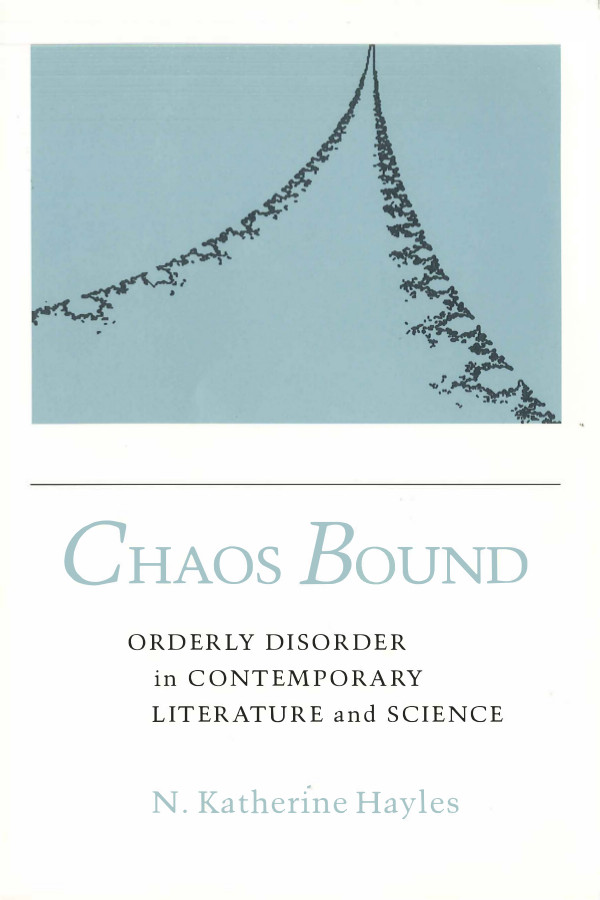N. Katherine Hayles: Chaos Bound: Orderly Disorder in Contemporary Literature and Science (1990)
Filed under book | Tags: · chaos theory, entropy, history of literature, information theory, literary theory, literature, nonlinearity, physics, postmodernism, poststructuralism, science, thermodynamics, writing

“At the same time that the study of nonlinear dynamics came into its own in the sciences, the focus of literary studies shifted toward local, fragmentary modes of analysis in which texts were no longer regarded as deterministic or predictable. N. Katherine Hayles here investigates parallels between contemporary literature and critical theory and the emerging interdisciplinary field known as the science of chaos. She finds in both scientific and literary discourse new interpretations of chaos, which is seen no longer as disorder but as a locus of maximum information and complexity. The new paradigm of chaos includes elements that, Hayles shows, were evident in literary theory and literature before they became prominent in the sciences. She asserts that such similarities between the natural and human sciences are the result not of direct influence but of roots in a common cultural matrix.
Hayles traces the evolution of the concept of chaos and evaluates the work of such theorists as Prigogine, Feigenbaum, and Mandelbrot, for whom chaos entails an unpredictably open universe in which knowledge is limited to local sites and scientific models can never exhaust the possibilities of the actual. But this view does not imply that scientists have given up the search for global explanations of natural phenomena, for chaos is conceived of as containing its own form of order. Hayles envisions chaos as a double-edged sword: it can be viewed either as a recognition that disorder plays a more important role in natural processes than had hitherto been recognized or as an extension of order into areas that had hitherto resisted formalization. She examines structures and themes of disorder in The Education of Henry Adams, Doris Lessing’s Golden Notebook, and works by Stanislaw Lem. Hayles concludes by showing how the writings of poststructuralist theorists incorporate central features of chaos theory-such as an interest in relating local sites to global structures; a conception of order and disorder as interpenetrating rather than opposed; an awareness that in complex systems small causes can lead to massive effects; and an understanding that complex systems can be both deterministic and unpredictable.
Chaos Bound contributes to and enliven current debates among chaos theorists, cultural critics and cultural historians, critical theorists, literary critics interested in nineteenth- and twentieth-century literature, researchers in nonlinear dynamics, and others concerned with the relation between science and culture.” (from the back cover)
Publisher Cornell University Press, 1990
ISBN 0801497019, 9780801497018
309 pages
via author
Review: Tom LeClair (SubStance, 1991)
See also Hayles, The Cosmic Web: Scientific Field Models and Literary Strategies in the Twentieth Century, 1984.
Comment (0)Alan Sokal, Jean Bricmont: Intellectual Impostures: Postmodern Philosophers’ Abuse of Science (1997–) [FR, EN, ES, IT, RU, TR, PL]
Filed under book | Tags: · critique, cultural theory, humanities, philosophy, postmodernism, science, theory

When Intellectual Impostures was published in France, it sent shock waves through the Left Bank establishment. When it was published in Britain, it provoked vicious debate. Sokal and Bricmont examine the canon of French postmodernists – Lacan, Kristeva, Baudrillard, Irigaray, Latour, Virilio, Deleuze and Guattari – and systematically expose their abuse of science.
French edition
Publisher Odile Jacob, Paris, 1997
413 pages
English edition
Publisher Profile Books, 1998
ISBN 1861970749, 9781861970749
274 pages
Wikipedia (EN)
Impostures intellectuelles (French, 2nd Edition, 1997, DJVU)
Intellectual Impostures (English, 1998/99, EPUB), MOBI.
Fashionable Nonsense (English, 1998)
Imposturas intelectuales (Spanish, trans. Joan Caries Guix Vilaplana, 1999)
Imposture intellettuali (Italian, trans. Fabio Acerbi and Monica Ugaglia, 1999, added on 2014-10-24)
Интеллектуальные уловки. Критика современной философии постмодерна (Russian, 2002), HTML
Son moda saçmalıklar: Postmodern aydınların bilimi kötüye kullanmaları (Turkish, trans. Mehmet Baydur and Ongun Onaran, 2002)
Modne bzdury: O nadużywaniu pojęć z zakresu nauk ścisłych przez postmodernistycznych intelektualistów (Polish, trans. Piotr Amsterdamski, 2004)
See also:
Mara Beller, “The Sokal Hoax: At Whom Are We Laughing?” (published in Physics Today, September 1998, pp 29-34)
Ian Buchanan (ed.): Jameson on Jameson: Conversations on Cultural Marxism (2007)
Filed under book | Tags: · architecture, art, capitalism, cinema, cognition, ideology, literary theory, literature, marxism, modernism, philosophy, politics, postmodern, postmodernism, poststructuralism, psychoanalysis, urbanism, utopia

Fredric Jameson is one of the most influential literary and cultural critics writing today. He is a theoretical innovator whose ideas about the intersections of politics and culture have reshaped the critical landscape across the humanities and social sciences. Bringing together ten interviews conducted between 1982 and 2005, Jameson on Jameson is a compellingly candid introduction to his thought for those new to it, and a rich source of illumination and clarification for those seeking deeper understanding. Jameson discusses his intellectual and political preoccupations, most prominently his commitment to Marxism as a way of critiquing capitalism and the culture it has engendered. He explains many of his key concepts, including postmodernism, the dialectic, metacommentary, the political unconscious, the utopian, cognitive mapping, and spatialization.
Jameson on Jameson displays Jameson’s extraordinary grasp of contemporary culture—architecture, art, cinema, literature, philosophy, politics, psychoanalysis, and urban geography—as well as the challenge that the geographic reach of his thinking poses to the Eurocentricity of the West. Conducted by accomplished scholars from United States, Egypt, Korea, China, Sweden, and England, the interviews elicit Jameson’s reflections on the broad international significance of his ideas and their applicability and implications in different cultural and political contexts, including the present phase of globalization.
The volume includes an introduction by Jameson and a comprehensive bibliography of his publications in all languages.
Interviewers: Mona Abousenna, Abbas Al-Tonsi, Srinivas Aravamudan, Jonathan Culler, Sara Danius, Leonard Green, Sabry Hafez, Stuart Hall, Stefan Jonsson, Ranjana Khanna, Richard Klein, Horacio Machin, Paik Nak-chung, Michael Speaks, Anders Stephanson, Xudong Zhang
Publisher Duke University Press, 2007
Post-Contemporary Interventions series
ISBN 0822340879, 9780822340874
296 pages

